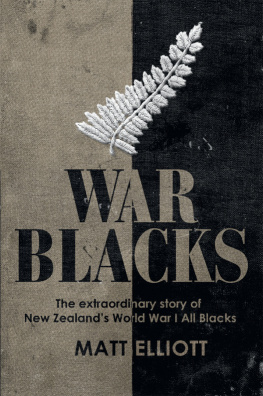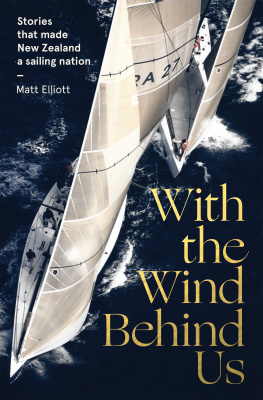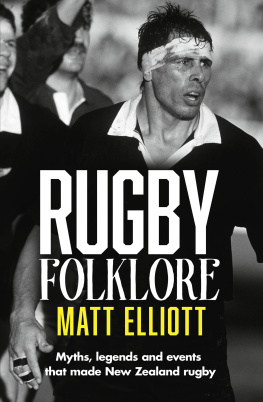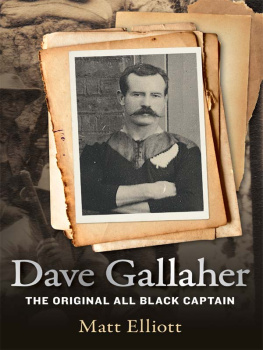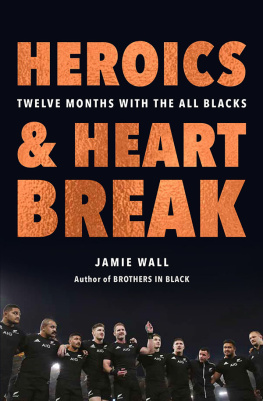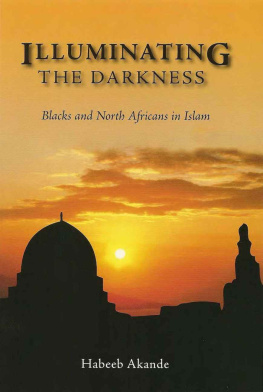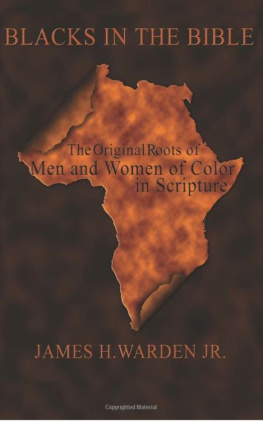Matt Elliott - War Blacks: The extraordinary story of New Zealands WWI All Blacks
Here you can read online Matt Elliott - War Blacks: The extraordinary story of New Zealands WWI All Blacks full text of the book (entire story) in english for free. Download pdf and epub, get meaning, cover and reviews about this ebook. year: 2016, publisher: HarperCollins Publishers, genre: Non-fiction. Description of the work, (preface) as well as reviews are available. Best literature library LitArk.com created for fans of good reading and offers a wide selection of genres:
Romance novel
Science fiction
Adventure
Detective
Science
History
Home and family
Prose
Art
Politics
Computer
Non-fiction
Religion
Business
Children
Humor
Choose a favorite category and find really read worthwhile books. Enjoy immersion in the world of imagination, feel the emotions of the characters or learn something new for yourself, make an fascinating discovery.
- Book:War Blacks: The extraordinary story of New Zealands WWI All Blacks
- Author:
- Publisher:HarperCollins Publishers
- Genre:
- Year:2016
- Rating:5 / 5
- Favourites:Add to favourites
- Your mark:
- 100
- 1
- 2
- 3
- 4
- 5
War Blacks: The extraordinary story of New Zealands WWI All Blacks: summary, description and annotation
We offer to read an annotation, description, summary or preface (depends on what the author of the book "War Blacks: The extraordinary story of New Zealands WWI All Blacks" wrote himself). If you haven't found the necessary information about the book — write in the comments, we will try to find it.
War Blacks: The extraordinary story of New Zealands WWI All Blacks — read online for free the complete book (whole text) full work
Below is the text of the book, divided by pages. System saving the place of the last page read, allows you to conveniently read the book "War Blacks: The extraordinary story of New Zealands WWI All Blacks" online for free, without having to search again every time where you left off. Put a bookmark, and you can go to the page where you finished reading at any time.
Font size:
Interval:
Bookmark:
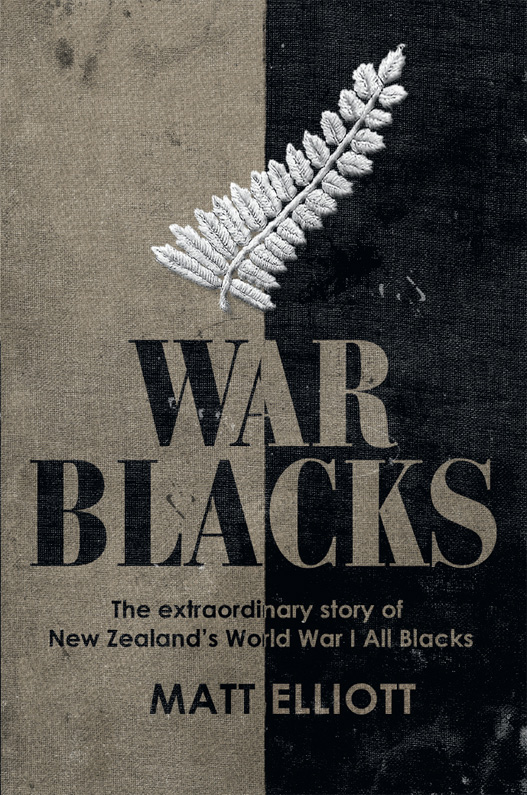
This book is dedicated to my wife, Melissa,
ever supportive and enthusiastic,
especially during a three-book year
The horror and strains that this war would impose on the human spirit were unknown, and never contemplated. There is an air of unreality in looking back on the sailing of the Main Body of the New Zealand Expeditionary Force [NZEF] in October 1914. It was more like the start of an international tour by an All Black team rather than soldiers embarking for a war.
Christopher Pugsley, military historian
Another of New Zealands best known footballers has made the supreme sacrifice after playing the game for the Empire on a wider field.
widely published newspaper item noting the death of 1913 All Black Reginald Taylor
I left my best rugby years on the desert.
Beethoven Beet Algar, All Black captain (1920)
The sad fate of 13 men who had worn the black jersey and silver fern in representing their country as All Blacks has been the subject of numerous newspaper and book mentions in the century since their deaths during World War I. Such is the place of rugby football in our countrys psyche that those men are remembered today because of their place in the history of rugby, in a way that many of our other sporting champions tend not to be. This book sets out to record the contributions of All Blacks, both famous and forgotten, to the war effort of 191418. Some men were All Blacks, then soldiers. Others were soldiers, wearing the double silver fern of the New Zealand Expeditionary Force (NZEF), then All Blacks. Most spent much longer in khaki than they did in black.
For a long time I had wanted to know just how many All Blacks experienced Samoa, Gallipoli, Sinai and Palestine, the Western Front, base depots in England or training camps at home. In 1981, esteemed rugby historians Rod Chester and Neville McMillan published their first Encyclopaedia of New Zealand Rugby, containing potted profiles of every man who had taken the field as an All Black to that point. In it, the service records and decorations from World War I were included in the biographies of about a third of the 93 men included in this book. There were, of course, many more men whose war experiences were not mentioned, so in the last months of 2014 I began searching for them and, by the time of the centenary of the Anzac (Australian and New Zealand Army Corps) landings at Gallipoli, I had compiled the list that makes up this book.
Our rugby history is recorded in detail that is not matched anywhere in the world, which means that it is easy to chart the careers of our All Blacks. The history of our involvement in World War I, and the men and women who were among the 110,000 who served, is a different matter. While there has been a plethora of new material available in recent years (to which this author has been a contributor), official regimental or battalion histories written in the years after the Armistice were about the respective groups of men, rather than individuals. So, I have tried to, where possible, situate soldiers in the specifics of their service rather than just within the larger group.
At the same time, this book charts the effect of the Great War on our great game and the role our national sport played as recreation for servicemen. Where our soldiers went, so did rugby football. From there, Services rugby and war veterans were an integral part of the revival of the game and made up one of New Zealands greatest-ever football teams, the 192425 Invincibles.
When it comes to army service, I have included the time men spent in training rather than just the time spent overseas. There are two reasons for this. Firstly, some men spent up to a year at Trentham and Featherston camps before sailing overseas. Thus, their time overseas would not be properly representative of their military service. Secondly, one or two conscripted men (towards the end of the war) spent time in camp and did not go overseas. That tells a story in itself of the final stages of the war, and to exclude them when they did serve their country would not be fair to their memory.
Today, rugby, like no other sport, is described in the terminology of war. At the beginning of the Great War, that escalating conflict was being described as the game. The reality became something very different. My then 19-year-old grandfather wrote in his 1917 diary while fighting on the Western Front that the war was a living hell. Todays players may talk about other players they would want to go to battle with or have in the trenches with them, but you never hear a rugby game being described as a living hell.
The experiences of war were unspeakable for many who endured them, whereas the exploits of rugby players on the field have been told and retold for decades. I hope this book adds to the history of our national game and our consideration of the men who played and fought. As Richie McCaw said of Victoria Cross winner Willie Apiata, who was involved with the All Blacks during the 2015 Rugby World Cup, Hes a good man to have around, and the boys enjoyed hearing a few of his stories and calming words. If you talk about being in pressure environments, hes probably been in environments that are a damn sight more pressurised than we end up with.
The enlistment date for each man is taken from his service record as the day he entered training camp. The rank is that attained by the end of the war and decorations are included. Some soldiers embarked with one group but ended up serving with others, and that is noted in the profiles. The playing records list known clubs, provinces and other selections, such as for the North Island or the short-lived North and South Island Country teams. Surprisingly, it was less than 20 years ago that the number of men who had played for the All Blacks was finally counted by rugby historian Ron Palenski. By the end of the 2015 season, 1,146 men had worn the black jersey, and a players representative number has become an integral part of their biographical details.
In consideration of the descendants of the men herein, it was decided not to include some of the more intimate details of a number of medical conditions, illnesses or wounds.
The All Blacks (as we now call them) had their inauguration in 1884 when a nationally selected side visited New South Wales, reciprocating a visit from their hosts in 1882. Following the formal establishment of the New Zealand Rugby Football Union (NZRFU) in 1892, there were further visits across the Tasman in 1893 and 1897. New South Wales were welcomed again in 1894 and 1901, while Queensland undertook a tour in 1896.
Wellington was the home of the NZRFU, and, being in the middle of the country, was where the All Blacks assembled before sailing away on tour. A farewell match would often be played at Athletic Park against Wellington. When the All Blacks returned home a match would usually be staged in Auckland, too, before the players drifted off to their home towns.
In 1902, what would become the most prized and keenly contested trophy in New Zealand provincial rugby, the Ranfurly Shield, was gifted to the NZRFU by the then Governor of New Zealand, the Earl of Ranfurly. The NZRFU decided that the Shield would be a challenge trophy, and Auckland were chosen to be the first holders. They had been the champion side of 1902, as well as being unbeaten in 22 matches (although they had played 3 drawn games) stretching back to 1897. In 1903, Auckland were undertaking a southern tour, meaning that none of their seven games would be in Auckland, so the first defence was not until 6 August 1904. Challengers Wellington won a tight contest 63 in front of 9,000 spectators at Alexandra Park. The gate-takings topped 500, then the highest amount for any inter-provincial match in New Zealand. A member of the victorious Wellington team, William Hardham, was the only New Zealand soldier to be awarded the Victoria Cross in the Boer War, where he served as a farrier. A well-known club player and Wellington representative between 1897 and 1910, Hardham would rise to the rank of major during World War I, serving with the Wellington Mounted Rifles at Gallipoli and in the Middle East. He donated a trophy in his name to the Wellington Rugby Union to be awarded to the winner of the second-division club competition.
Font size:
Interval:
Bookmark:
Similar books «War Blacks: The extraordinary story of New Zealands WWI All Blacks»
Look at similar books to War Blacks: The extraordinary story of New Zealands WWI All Blacks. We have selected literature similar in name and meaning in the hope of providing readers with more options to find new, interesting, not yet read works.
Discussion, reviews of the book War Blacks: The extraordinary story of New Zealands WWI All Blacks and just readers' own opinions. Leave your comments, write what you think about the work, its meaning or the main characters. Specify what exactly you liked and what you didn't like, and why you think so.

